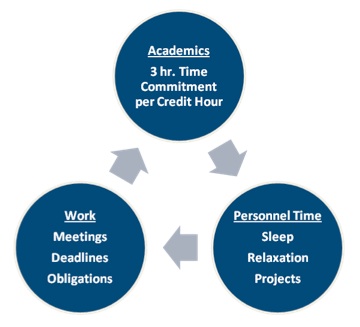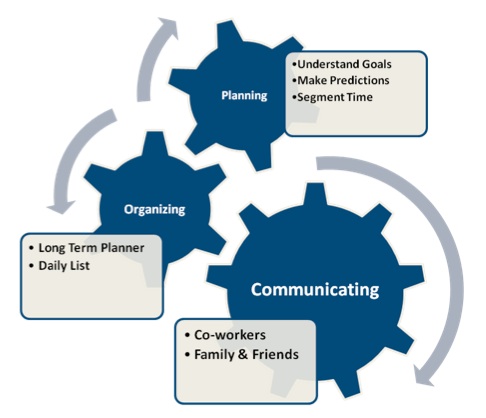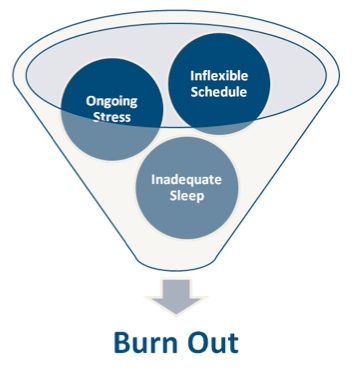Time Management (Juggling Act)
A combination of self-knowledge, repetition, planning and communicating, time management is reportedly the number one problem of online students.
Scheduling
Recognizing Personal, Financial & Social Requirements
 Self-knowledge is an online student’s greatest asset. Things offering the most satisfaction and one’s physical limitations play an important role in everyday choices and decision making. A good understanding of them is the best way to achieve a healthy balance without letting any of the balls drop.
Self-knowledge is an online student’s greatest asset. Things offering the most satisfaction and one’s physical limitations play an important role in everyday choices and decision making. A good understanding of them is the best way to achieve a healthy balance without letting any of the balls drop.
Driving motivators can be divided up into three groups of values, starting with the things that provide personal inward satisfaction and serve to make people happy with being the person they are. The second set of values revolves around a person’s salary, which provides people with the lifestyle they’re comfortable living with shelter, clothes and other amenities.
However, personal satisfaction and money are not the only motivators. People also need to feel connected. The third group of values revolves around the things that save a person from social isolation, such as religion and family. A clear understanding of these values will provide a good understanding of individual long term goals, making a student’s workload easier with the satisfaction of caring about it.
Developing a Routine
When organizing a schedule around three different responsibilities, the first step is to have a clear understanding of goals and expectations for each one. The second is to predict the routine cycles of each one in order to avoid over scheduling. Knowing that September is a very school intensive month will prevent the frustration of organizing an event at home or work when already stretched too thin.
Marking off segments of time for specific routine tasks, the final step is repetition. Stable schedules and good study habits are created by closely followed routines that ingrain habitual daily actions.
Designated time for studying should be set during the morning when things are usually quietest or right after getting home from work as a way to unwind. A single three credit class is a nine hour time commitment. One credit hour equates to a three hour time commitment, one for instruction and two for preparation. Three hours of exhausted studying equates to one hour of studying when not already drained from the day. For this reason, late night studying is best to be avoided despite the quiet time of day.
Planning Ahead & For Today
Every student should own a long-term planner that contains the due dates for homework, projects, research papers and exams. It should also include any important work related deadlines and events as well as any home responsibilities, such as birthdays and celebrations. Simplifying a long term schedule into daily tasks is a good way to keep priorities in focus while not getting overwhelmed with everything else in between. Daily schedules are best made from lists that recognize and organize the most imminent things to see accomplished.
own a long-term planner that contains the due dates for homework, projects, research papers and exams. It should also include any important work related deadlines and events as well as any home responsibilities, such as birthdays and celebrations. Simplifying a long term schedule into daily tasks is a good way to keep priorities in focus while not getting overwhelmed with everything else in between. Daily schedules are best made from lists that recognize and organize the most imminent things to see accomplished.
The necessary requirements of every daily routine include two segmented slots of time for review and quiet. Daily review is important simply because consistent contact with the material cuts down on future studying requirements. Helping to ward off feeling overwhelmed, at least an hour of scheduled quiet time is a necessary aspect of any day. It allows people to catch up on email, return any messages and work on projects. Also, taking a step back can help create a fresh perspective on other obligations.
Communicating
While juggling the responsibilities of multiple demands, support is very important from all ends, especially at home and in the workplace. The key to a good support network is good communication. Communicating with family members and co-workers is essential to overall understanding and maintaining a healthy relationship with each place.
 In the workplace, a shared utility calendar is the most useful tool in maintaining a schedule and communicating availability to co-workers, saving everyone time when planning events. Talking with co-workers about overlapping hours and shared tasks can also be helpful when things start piling up. By helping them out when the pressure’s on, they should be happy to return the favor during exam week.
In the workplace, a shared utility calendar is the most useful tool in maintaining a schedule and communicating availability to co-workers, saving everyone time when planning events. Talking with co-workers about overlapping hours and shared tasks can also be helpful when things start piling up. By helping them out when the pressure’s on, they should be happy to return the favor during exam week.
Basically functioning as two different locations, home can be the most difficult setting to manage and is usually where arguments begin. Support from family members is very important to any student’s motivation. The best way to keep it in tact and avoid arguments is by keeping different responsibilities in their separate places. Constant communication and updates are essential to this process. It does not have to be verbal communication. Leaving signs around the house and on doors is an excellent and non-confrontational way to keep family members informed and protect study time from accidentally getting mistaken as relaxation time.
Procrastinating
Snowball Effect
The snowball effect is the introduction to a student’s burn out, bringing with it added pressure, stress and a sense of hopelessness. As with any snowball, this effect is created by the continual piling up of missed and overdue assignments combined with the stress approaching deadlines. However, abominable snow monster are easy prevented by completing assignments when assigned from the very beginning.
Gathering required course materials ahead of time is the first step in deterring what could become a continuously mounting ball of work, which leaves students in constant state of playing catch-up. This snowball can eventually lead to skipping entire discussions. It always starts with one, being late on one discussion question. The more missed, the easier it is to justify skipping them completely.
Burnout
 Procrastination leads to a snowball effect, which in turn leads to a potential burnout. The snowball effect brings with it continuous stress and late nights with little sleep. Burnouts are made of exhaustion: mental exhaustion from looming amounts of work, physical exhaustion from inadequate sleep and emotional exhaustion from feeling overwhelmed.
Procrastination leads to a snowball effect, which in turn leads to a potential burnout. The snowball effect brings with it continuous stress and late nights with little sleep. Burnouts are made of exhaustion: mental exhaustion from looming amounts of work, physical exhaustion from inadequate sleep and emotional exhaustion from feeling overwhelmed.
Being overwhelmed and being helpless are separated by a very thin line based solely on perspective. They can eventually become one and the same, leading a person to apathy and to being numb. Numb individuals are not good students. They are not good employees. Failing classes and losing jobs, victims of burnout are haunted by a negative perspective that can destroy an individual’s relationships and health.
Keep an eye on humor. Laughter is always the first victim of stress and will disappear long before an official burnout begins. Stress also has a nasty habit of tightening flexible schedules, adding constraining conflict and burden to daily routines. Scheduled breaks are a good way to keep routines in perspective. For this reason, lunch and study breaks are an excellent and necessary defense against unhealthy levels of stress.
